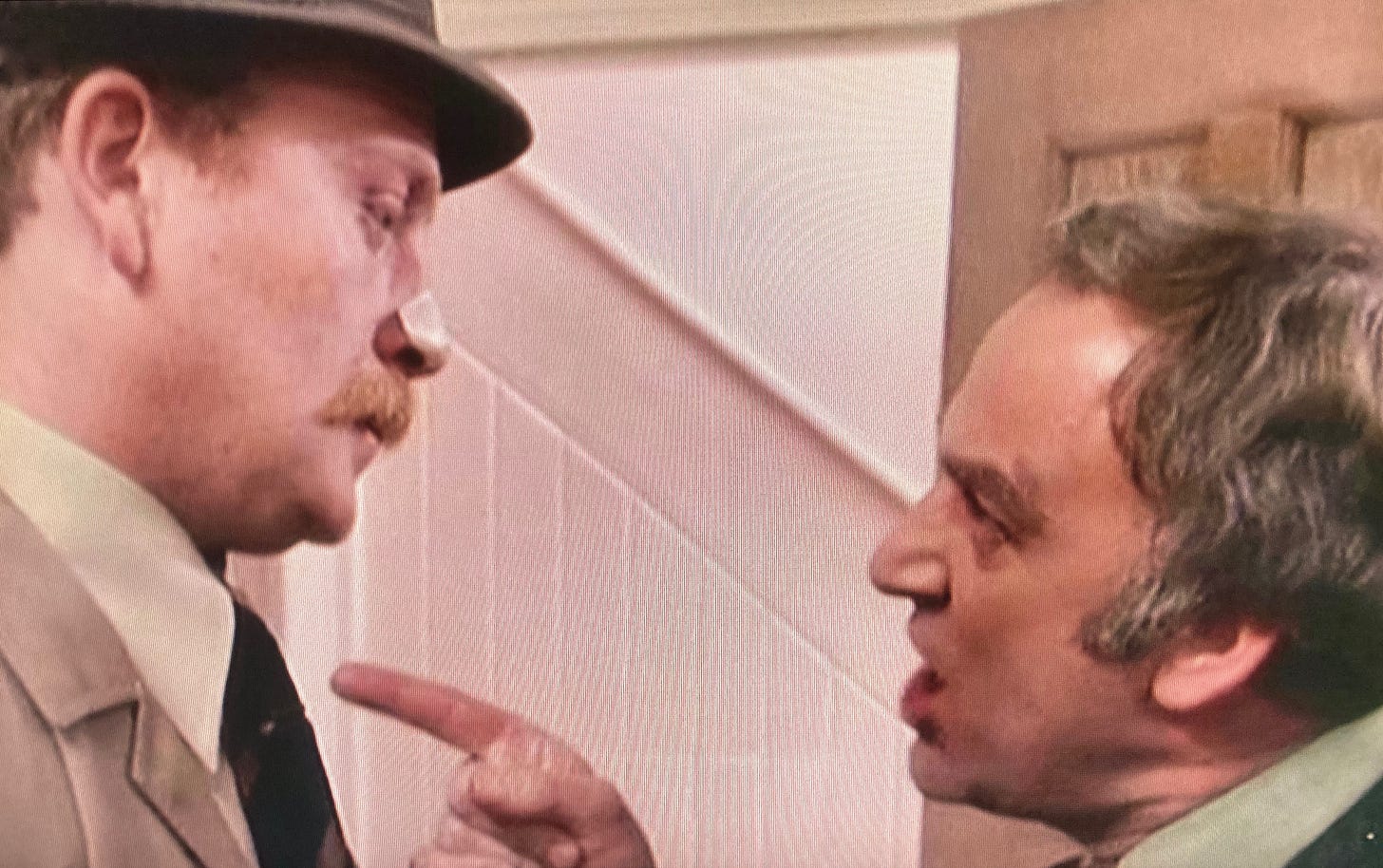
Ian Hoey takes a trip back to the 1970s, recalling the time James Cosmo teamed up with The Sweeney.
Ever since it first appeared on television screens in 1975, The Sweeney has been part of U.K. popular culture. The fourth and final series may have come to an end in 1978 but the characters and tone of the drama remain reference points for all that has followed since.
Combine that with the iconic theme music by Harry South, which is recognisable to many more people than have actually seen the show, and it all adds up to one mighty presence in British TV history.
I’m of a suitable age to have watched The Sweeney when it was first broadcast on weekdays at 9pm on ITV. It was such a fixture in my viewing habits that I was convinced I must have seen every episode, either on the first run or in the regular repeats, which carried on in the same timeslots into the early eighties.
This is why I was surprised to stumble upon an episode of which I had no recollection. The seventies and eighties were a long time ago of course, so being unable to recollect any specific instalment shouldn’t be too unlikely a thing, but this particular episode had an abundance of elements that would surely have stuck in my head had I seen it. The appearance of a specific, infamous drink should have been enough to ingrain it on my memory.
The episode in question was the second of the final series. Entitled Hard Men, it was the last of the six (over the four series) written by Troy Kennedy Martin, brother of Ian Kennedy Martin, creator of the programme.
Before The Sweeney, Troy already had an established reputation as a screenwriter, having written multiple episodes of Z-Cars, of which he was co-creator, plus the screenplays for The Italian Job (1969) and Kelly’s Heroes (1970). With Hard Men it seems Troy wanted to acknowledge the land of his birth (he was born in Rothesay) and to fill this London-based cop show with a strong flavour of Scotland, the West Coast in particular.
The premise is simple. Three violent Scottish criminals have come to London to commit an as yet unspecified crime (it later transpires it’s the kidnap of the seven-year-old daughter of a rival gangster). Pursuing them from Glasgow comes Detective Sergeant Davy Freeth (James Cosmo). Despite their clear reluctance to do so, Regan (John Thaw) and Carter (Dennis Waterman) are assigned to assist him.
What follows is a clash of personalities that walks a majestic line between cultural stereotypes and public information film. Sure it has the all-too-common for the time portrayal of Scottish men as violent alcoholics, but it does so with the kind of insight only previously seen in the exceptional Play For Today output of Peter McDougall.
Anyone with even a passing knowledge of British television history should be aware that past studies of racial groups and nationalities in drama and comedy were regularly done in a lazy, often dreadfully offensive manner. It’s therefore no shock at all to see the kind of behaviour displayed by the Scottish ‘hard men’ in this episode. Yet, I believe, it’s all done with a nuance that can only be provided by someone who knows exactly what they are talking about, somebody who is simultaneously exposing the dark side and paying tribute to it.
Of particular interest is the way that Freeth is not objectified for the audience as a man to be laughed at, or even particularly disliked. Far from it. He’s the policeman on a mission while it’s the regular heroes of the series, Regan and Carter, that are seen as the potential stumbling blocks to the success of the enterprise. Caught up in their own lifestyles and habits, they are not only carelessly distracted but also resort to bullying behaviour towards their Scottish colleague.
The entire episode really is a thing to behold.
We’re less than a minute in, pre-credits, when two classic references are made in voiceover. As we watch Freeth get off the train, Regan initially refers to the Sergeant as “McHaggis: Scotland’s answer to the crimewave” before Carter, on noticing Freeth dispose of a sandwich wrapper says, “I thought they ate porridge?” to which Regan retorts, “They used to, until they discovered it was healthy.”
This isn’t the only sarcastic reference to eating habits. A bit later on, when Freeth objects to some unauthorised heavy-handed tactics by saying, “Where I come from we don’t batter down doors without a warrant,” Regan responds with, “Where you come from they’ll batter everything from fried fish to their bleeding grandmothers.”
They’ve dealt with food, so the next box to be ticked is violence. Back to the start of the episode and still pre-credits, we have Carter reading aloud the charge sheet of the men they are pursuing - “Assault with a deadly weapon. GBH. Attempted murder.” And then, in a line destined to infuriate a chunk of the Scottish populace, he asks, “What are they, Rangers supporters?”
This isn’t a plot that hangs around so, niceties over and opening credits rolled, it’s straight to the flat where the fugitives are known to be residing. Freeth bloodies his nose while charging the door down (although the prop door in question is quite obviously falling in before he hits it) and the policemen discover that, thanks to the incompetence of the Sweeney surveillance, the criminals have fled.
Two of them have anyhow, as one is lying on a bed, brutally knifed to death by his partners in crime. When Carter speculates that they might have been arguing over a game of cards, Freeth says it would have been over football or religion, clearly knowing that on the West Coast these two subjects very often go hand-in-hand. It’s a fantastic matter-of-fact observation.
The content of this scene (and the whole episode to be honest) that really caught my eye is shortly before this exchange. Glancing around the flat, Regan picks up an empty bottle from the dressing table, looks at it dismissively and reads the name at Freeth in an enquiring manner, “Eldorado?” Without a second of hesitation, Freeth counters with “Electric Soup” going on to explain to a distinctly unimpressed Regan that this is the nickname it has on Clydeside.
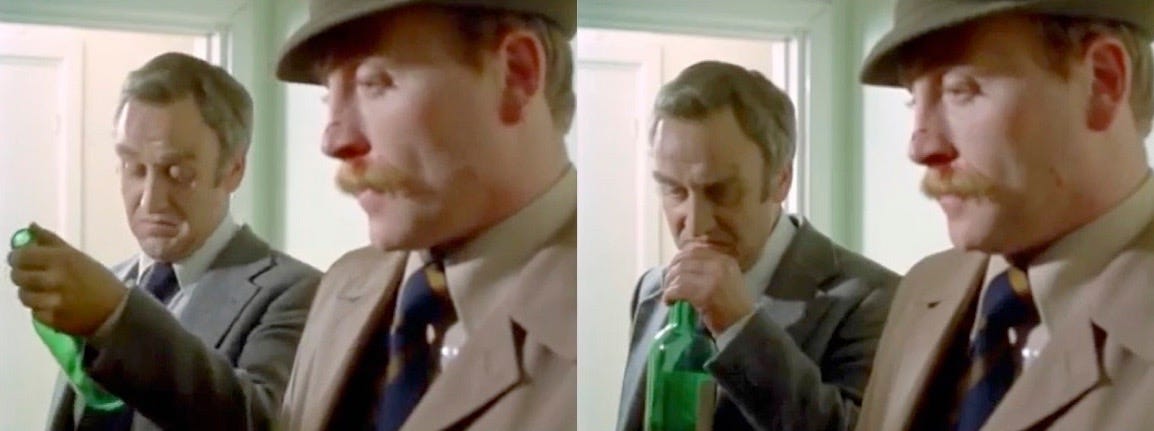
Eldorado is a fortified wine that was the staple diet of many a person in a reasonably limited geographical area of Scotland. I was one of them in my youth and could write a whole screed on that drink, but it’s best not to get too off-topic. Suffice to say that the only other occasions I’ve seen Eldorado get the significance it deserves is in two of Peter McDougall’s most renowned plays, The Elephants’ Graveyard (1976) and Just A Boys’ Game (1979). To see it discussed on an episode of The Sweeney is akin to hearing the actual school you went to get a mention on Coronation Street.
Booze and criminal motive discussion over, before they exit the flat Regan gets a call about another crime, an oddly contrasting one at that. Thieves have broken into Windsor Castle and stolen a painting. Regan can’t see why this should be landed at the door of the Sweeney to deal with and, truth be told, it is little more than a minor distraction from the main action involving the murderous drunken Scottish thugs.
Still, the Sweeney are expected to do something about the art theft and Freeth reluctantly agrees to help since they are short of officers. This is where the aforementioned door battering conversation comes up, as Regan and Carter want Freeth to use his physical prowess to illegally force entry into another home: a flat that is occupied by an Italian suspected of dealing in stolen art.
Perhaps mercifully, we never get to see the Italian or how he would be portrayed. This is largely thanks to them smashing in the door to the wrong flat, barging in on a posh dinner party instead. In a further delightful point of interest for the episode, Sir Henry, the host of this party, is none other than Norman Lumsden, known to many people as the fictitious J.R. Hartley from the Yellow Pages advert. We even see him on the phone in an echo of his most famous role.
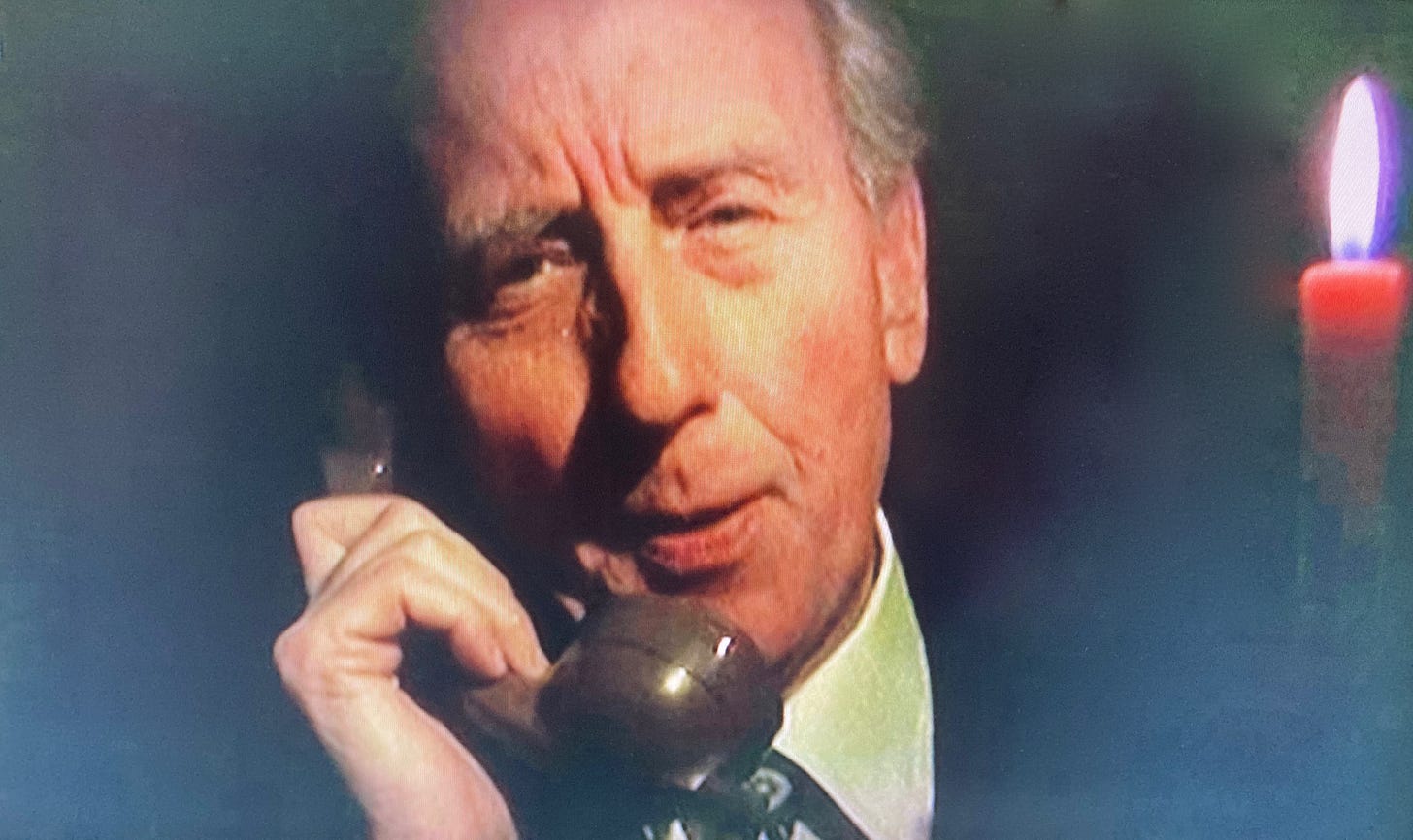
With Freeth now bleeding from another door-related wound, his head this time, Regan swiftly apologises and the errant cops are on their way to the correct flat. The upper class dinner party is unperturbed however and happy to continue feasting in a style akin to the ludicrous dining scene in Carry On Up The Khyber as they politely make comments like “Jolly good pâté.”
It seems the bumbling police at least got their initial suspicions right as the painting is now retrieved. All that remains of this subplot is for Regan to apportion the blame for the broken doors on “The flying Scotsman” and for the person who turns up to collect the stolen art work to point out that Detective Sergeant Freeth has a recognition amongst rugby fans as he plays number eight for Hawick! This curious fact has nothing more made of it, begging the question of why it gets mentioned at all.
Now back on the hunt for the Scottish hard men, Freeth and Carter have a rendezvous at the canal with a dodgy character by the name of Gibson who might be able to tip them off on the whereabouts of the thugs in exchange for the handing over of his criminal records. Also known by the nickname The Preacher, when the potential grass turns up he’s none other than a young Alex Norton.
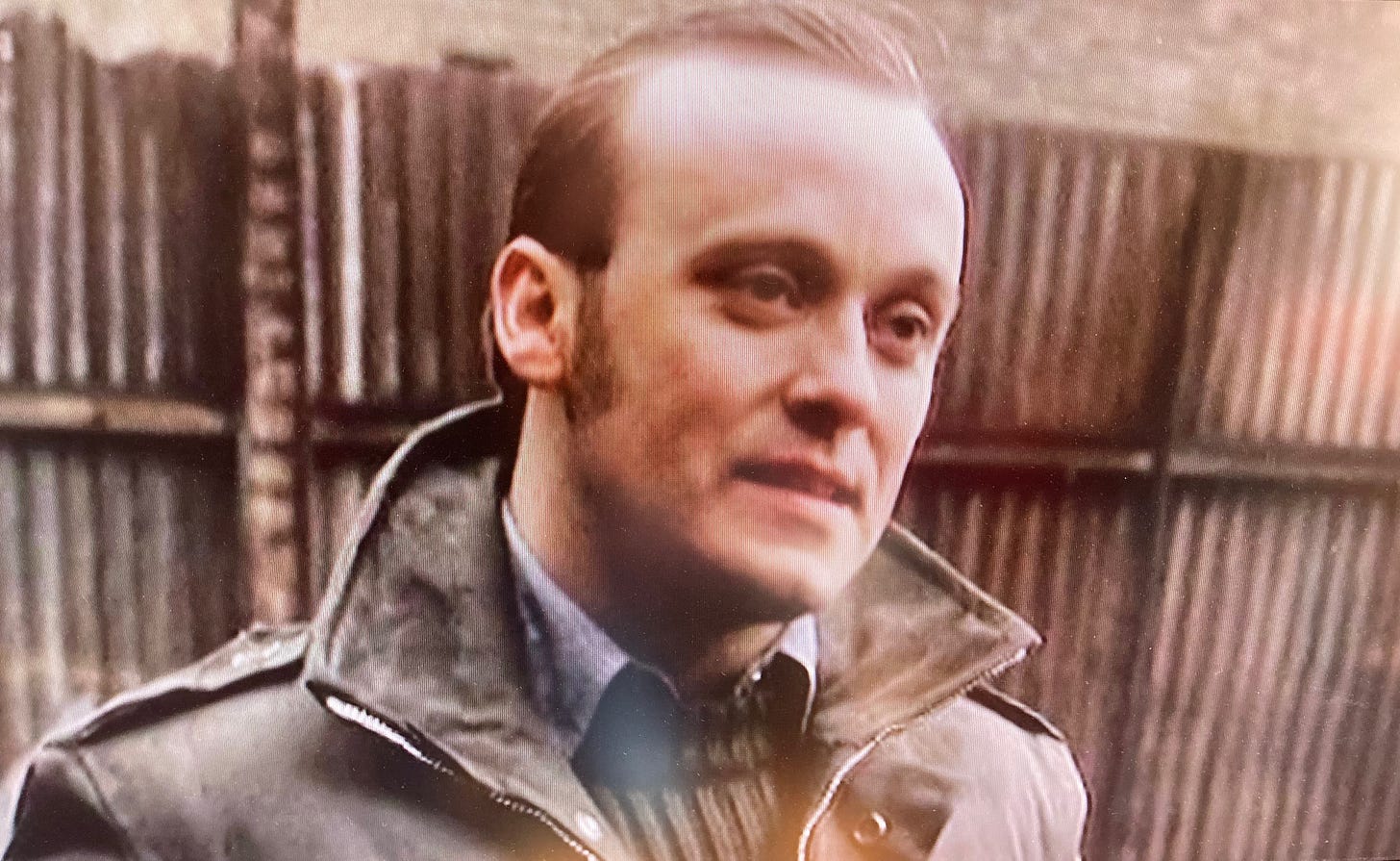
Gibson and Freeth are known to each other and Gibson attempts to wind the policeman up by revealing very little and alleging that one of the men, Stronnach, has returned to Glasgow to go after Freeth’s wife. Freeth plays it cool, although still comes out with the shocking line, “You’ve got the humour of a dead baby Gibson” before privately deducing that the two men are still in London and then tossing Gibson’s record into the water for him to scramble after.
Meanwhile, Regan listens to the tape of a tapped call between Freeth and his Glasgow superior and is unimpressed and confused when he hears Freeth say, “That Regan’s only interested in booze and hochmagandy.” That last word (Scottish slang for copulation) is a surprising choice and one that I can say I’ve never used in my life. However, a quick enquiry with friends of my age makes me suspect it’s maybe actually more surprising that the word passed me by.
It’s finally time for the viewer to see two of the hard men in action as Alan Ross and Charlie Stronnach sneak into the house of their intended victim. They’re a grim, sleazy pair and, sticking to type, Stronnach makes straight for a bottle of booze. This brutal duo hang around for a spell before the young girl and her mother return home and the woman has to put up a wild fight to enable the child to escape onto some waste ground near the house.
Shortly afterwards, with the thugs gone and the Sweeney in the house surveying the aftermath of the serious assault, Freeth turns up after apparently going to the wrong road, in Fulham. He’s confronted by an angry Regan whose fury multiplies in magnitude when Freeth correctly points out that he was, in fact, at the correct address and it was the thugs and the Sweeney that made the mistake. The drunken Scottish heavies went after the wrong child and assaulted the wrong mother.
Around this time, along with clarifying to Regan what hochmagandy means and saying he only uses it when he knows his phone his being tapped, Freeth also explains that teuchter is a “Highland expression for punter.” It isn’t. And quite why it is used a few times and then explained in this fashion is never clear. None of this linguistic conversation has eased Regan’s rage and he insists that the would-be kidnappers must be run out of London, “If they want to batter themselves to death, let them do it in Glasgow.”
To this end, Freeth finally phones, Joe Boyd, the big bad gangster in Glasgow whose child has been the target of this sloppy abduction attempt. Boyd has a truly bizarre accent of the sort that would have had viewers spitting their tea, Irn Bru or Eldorado over themselves when they first heard it. It’s a juicy bit of trivia that Boyd is played by Ian Ricketts, a drama teacher so beloved of his former students at the Guildford School of Acting, where he worked for more than 40 years, that they’ve erected a bronze bust of him at the school. Graduates from that place of learning include Brenda Blethyn (who paid for the bust), Bill Nighy, Celia Imrie, Isy Suttie and many others. I guess they had a separate accent coach on the staff.
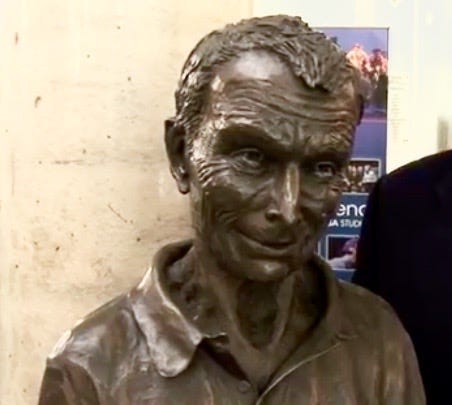
Boyd knows where the thugs are and makes a deal with Freeth. It wouldn’t be good for rival gangsters to think they can mess with Boyd, so somebody has to pay the ultimate price. As the strange-sounding top-villain says, “You can have one and I’ll have one. We have to set an example.”
We’re now nearing the episode finale and yet Regan still finds time to get sidetracked in other pursuits. He’s off to see a female acquaintance of his. But “Marge” isn’t there. “Been and gone. Africa, I think,” says Susan, the attractive young woman currently resident in the flat. Regan would like to pop in regardless, to retrieve something he left when he was last there. He tells Susan that the object in question is a “German steel helmet, a very valuable antique.”
The thing about this is that Regan has previous with this item of WWII memorabilia. Back in series three, in the episode entitled Visiting Fireman (also written by Troy Kennedy Martin), Regan ends up going home with a barmaid called Helga and persuading her to wear such a helmet whilst they are getting friendly. As far as recurring themes go, it’s certainly an eyebrow raiser.
And the old steel hat works its magic once again (even though observant viewers can tell it’s a different prop) as Regan is next seen to be in bed with Susan, who’s sporting the helmet. It’s our first proper look at Susan and we can see that she’s portrayed by future Blue Peter presenter Janet Ellis! We also get a very brief glimpse of a can of Younger’s Tartan Special on the bedside cabinet as an odd little further nod to the Scottish influence on this episode.
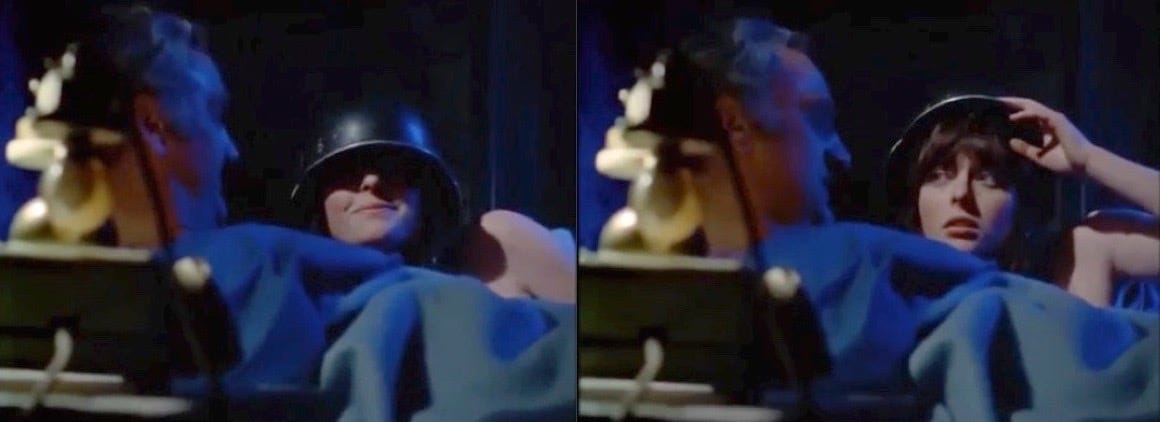
When Regan takes a phone call to update him on the situation with the pursuit of the hard men, Troy Kennedy Martin isn’t done with portraying this mildly upsetting fetish. Susan asks Regan who was on the phone and he replies, “Bit of business Marge…eh Sue…Susan, Jimmy, Hanz!” before messing around under the covers again.
In the meantime, Ross and Stronnach have been sitting around in a house, passing time, drinking of course. Stronnach has a badly scarred face from his battle with the girl’s mother and the bad guys emphasise their bad guy credentials by discussing how they “Should have finished her off.”
They’re in danger of getting finished off themselves though, since Gibson and another no-good type are staking them out in a car nearby. Gibson (who is justifying his ‘Preacher’ nickname by quoting the bible) and his colleague are clearly as bored as their targets and speculate as to when either of the thugs might finally leave the house. “They’ll be out sooner or later. They must be running out of drink.”
It’s Ross who finally hits the street and thus takes the hit. Fittingly for an episode as odd as this one, it’s no regular murder. The car drives up behind Ross, and Gibson’s cohort hangs out the passenger window to shoot Ross in the back… with a flare gun! Why this is the murder weapon of choice is anybody’s guess but it certainly upsets Stronnach.
He’s immediately got a far more upsetting problem on hand however, as Freeth has made it into the house and points a regular handgun at him. Such is the angry Detective Sergeant’s attitude that things look like they are about to take an even darker turn. Stronnach pleadingly asks Freeth if he’s going to let the hitmen away with that showy murder of Ross but Freeth isn’t interested in the hitmen. He orders Stronnach to lie on the bed and put a newspaper over his face.
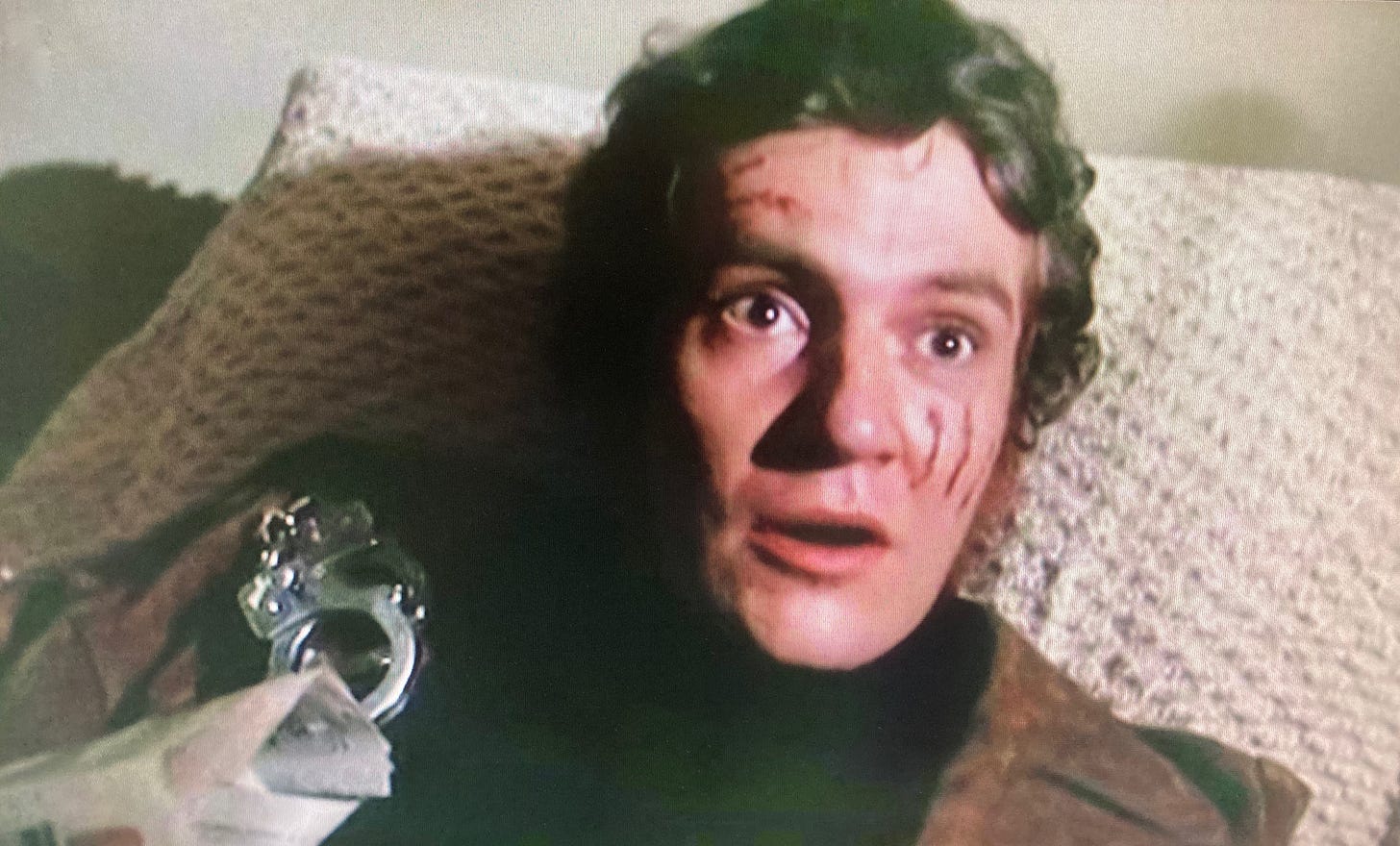
Just when it looks like we’re about to witness some savage retribution, Gibson and his flare-gun-toting murder-buddy start banging on the door demanding access to Stronnach. Freeth replies in the negative, tells them he’s taking this one back to Glasgow and then informs the cowering thug, “They’ve just saved your life pal.” Was Freeth bluffing or really about to perform an execution? We can’t be sure.
Now that the hard men are either arrested or dead, it’s immediately time for Freeth to get the train back across the border himself, with Regan and Carter seeing him off and the latter handing him a pornographic magazine for the journey. All that is left is for the London coppers to reflect a little on what transpired during Freeth’s visit.
“Tell you what,” says Carter, “if you think about it, he ran rings round us didn’t he?” Regan interestingly responds with a comment that reflects the growing political movement at the time, “Yeah, thank God they’re going independent, they can put that wall up again. What’s it called, Hadrian’s?”
And then, perhaps because Troy Kennedy Martin didn’t manage to squeeze them in elsewhere, there’s still time for a few further stereotypes to get a mention. Carter throws three classics into the mix, “You know what he told me? He’s never worn a kilt, he’s never had haggis and he’s never seen Ben Nevis.” Regan meanwhile stays true to type by simply wondering out loud, “What’s that stuff they drink? Electric Soup?”
This further reference to Eldorado would, for me, have made the perfect end to the episode, but it wasn’t to be. Things come to a close with a few further lines. Finally, still smarting at Freeth’s codeword to describe his overindulgence in bedroom activity, Regan asks his colleague, “Do you know what the Scottish word for fornication is?” Without taking a breath, Carter replies matter-of-factly, “Hochmagandy,” Regan looks disgusted and the end credits roll.
Whatever anybody makes of this piece of TV history, one thing seems very clear, James Cosmo delivered a perfectly measured performance, filling the role to such an extent that it would have been worthy of an attempted spin-off, perhaps back in Glasgow. Taggart would arrive five years later in 1983 and go on to prove that viewers were eager to see straight-talking Scottish police in gritty storylines, with plenty of dark humour to complement it. It’s no stretch of the imagination to think that Freeth could have got there first. Or maybe I’ve had too much Electric Soup.



I don't think Freeth disposes of a sandwich wrapper, it looks more like an empty bottle of whisky, which I thought then related to the joke "I take it you have had breakfast?"
Just watched this tonight, one of the best Sweeney episodes and I agree, Freeth would have made an excellent Glasgow based spinoff, Norton was also great in an early role as The Preacher.